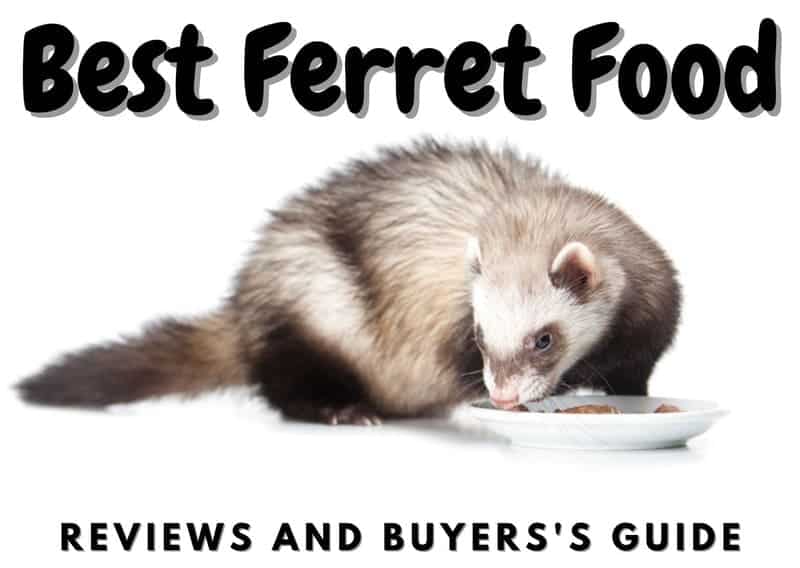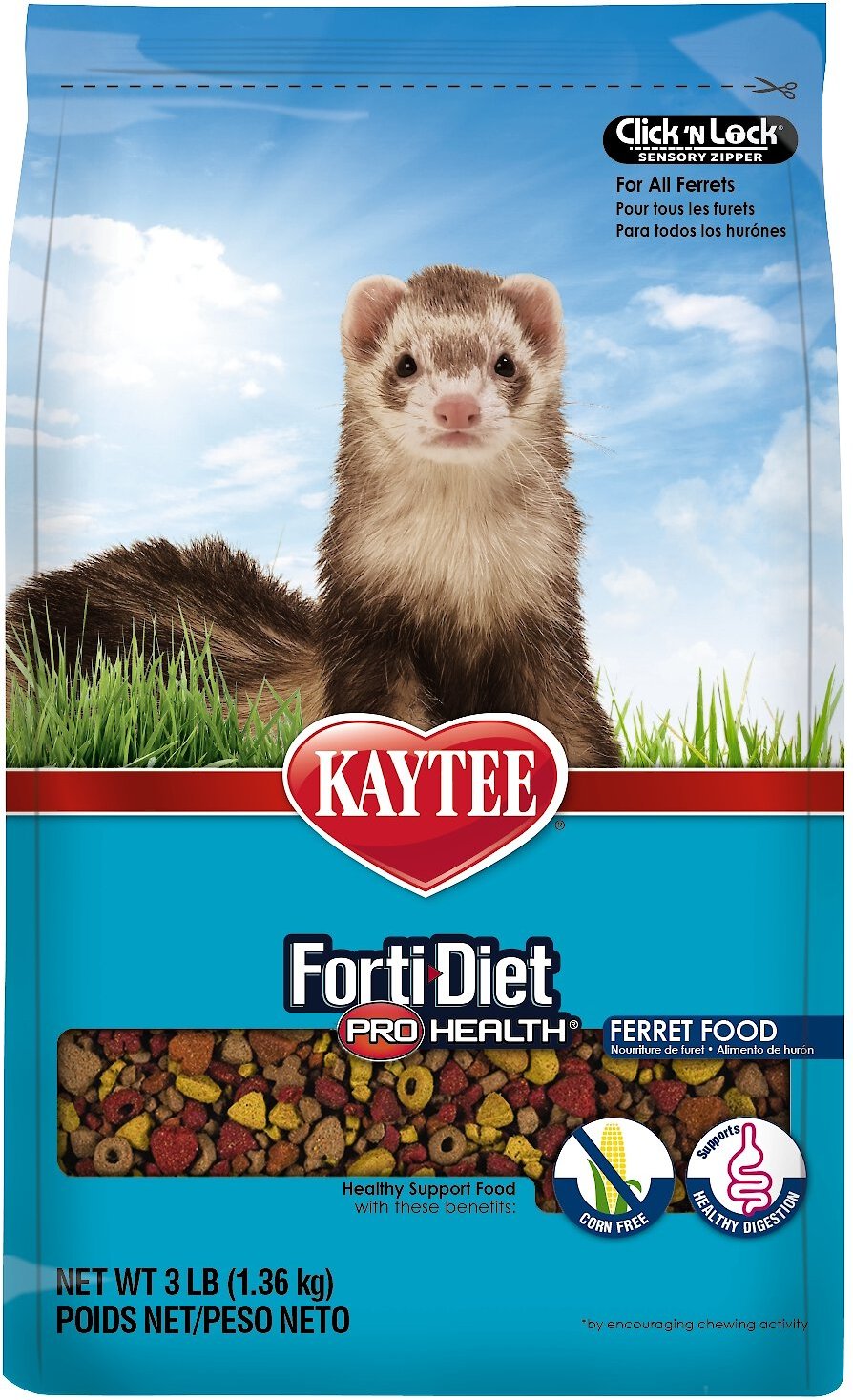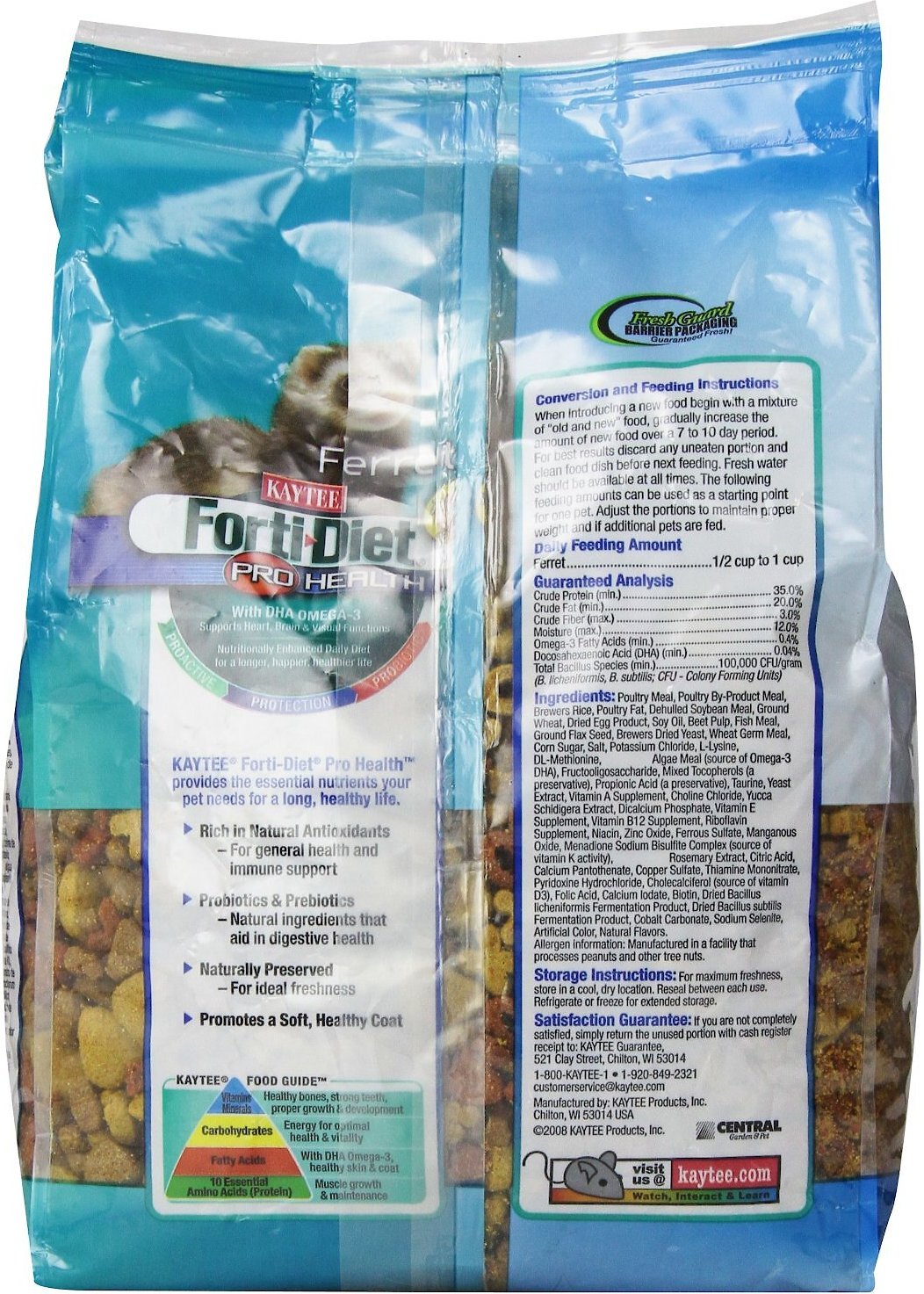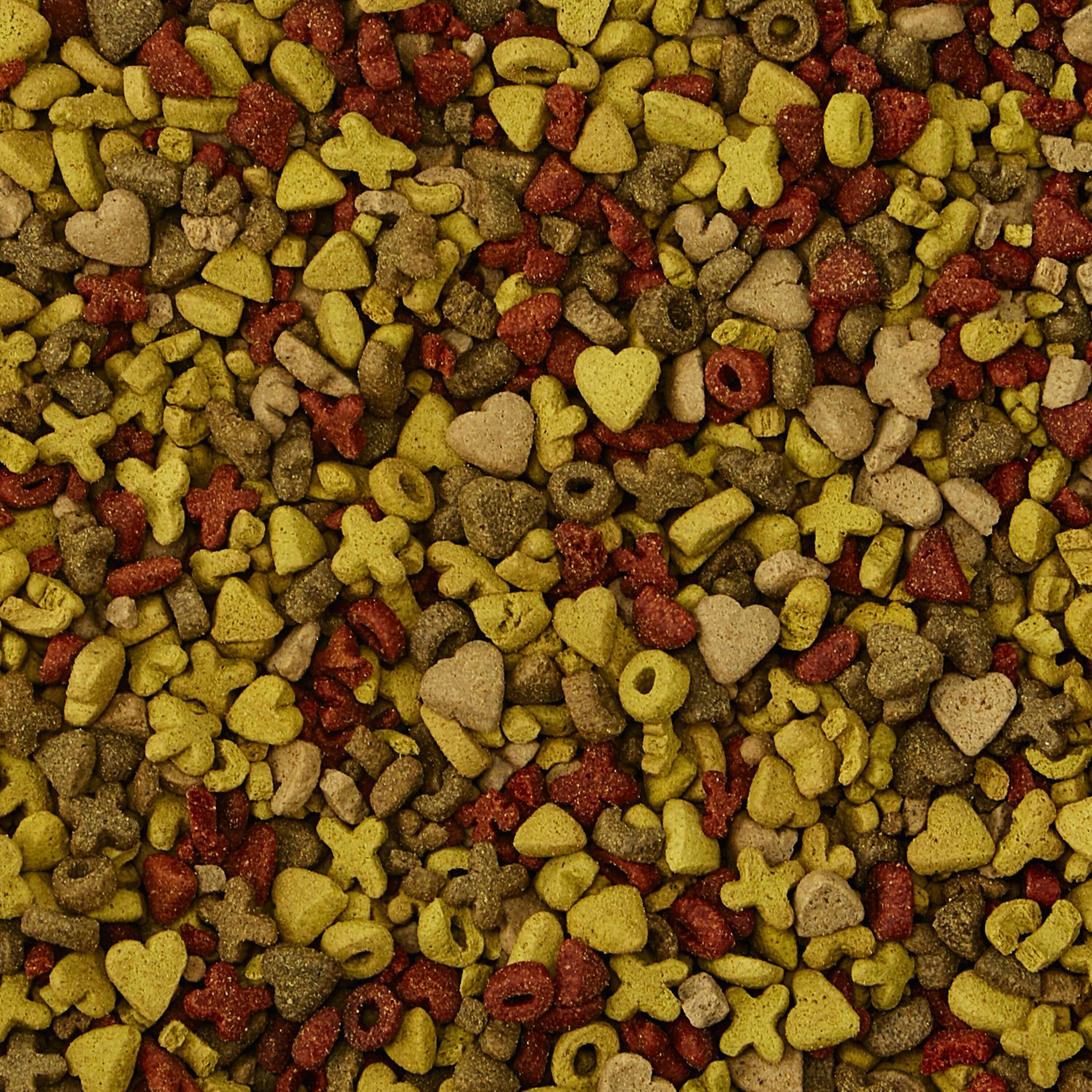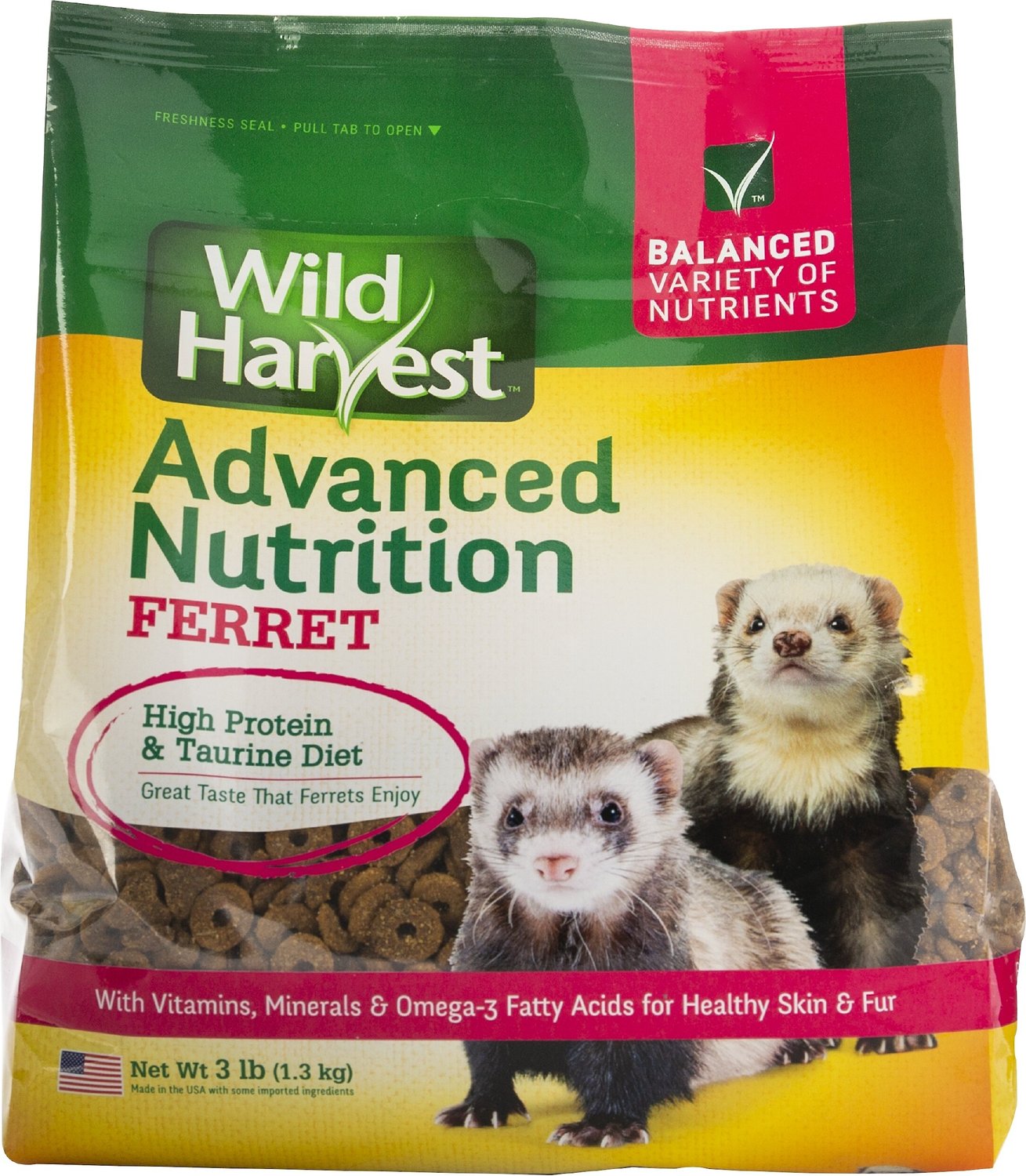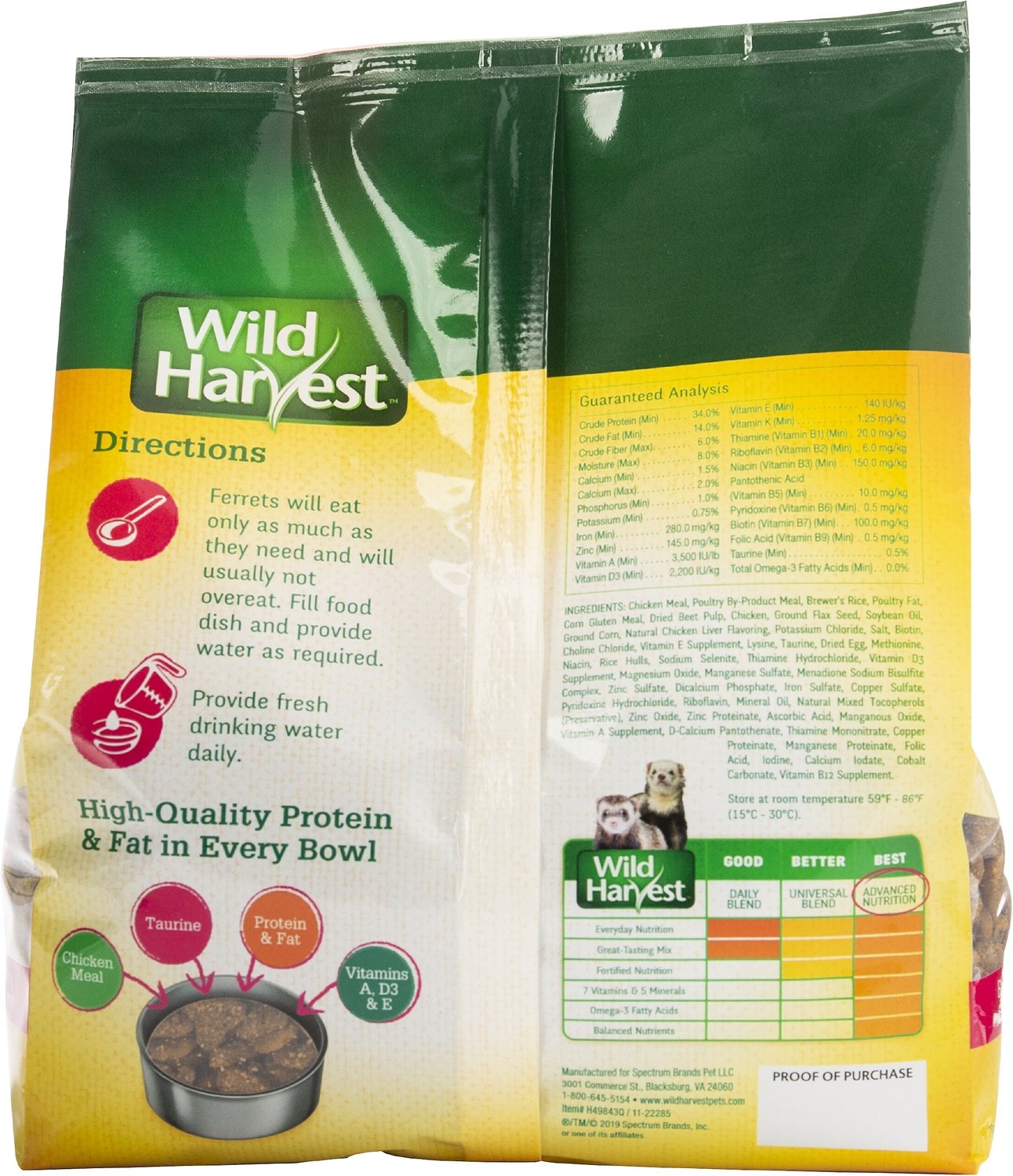Before you bring home your ferret, you should come to a decision about what kind of food you want to feed him. Because ferrets have such sensitive digestive systems and can be rather picky eaters, this choice can feel a little bit overwhelming. This is especially true because there is a lot of conflicting recommendations out there, and every brand is claiming that they have the best formula.
In this article, we have included a guide that teaches you everything you need to know about your ferret’s dietary needs, along with a review of 12 great ferret food options.
This post contains affiliate links, and I may be compensated if you make a purchase after clicking on my links, at no extra cost to you. Thanks!
12 Best Ferret Foods Currently On The Market
We are going to take a look at twelve great options. When reviewing these different foods, we included a general overview along with a couple of pros and cons so you can use what you learned in the above second to make an informed decision. If your ferret has any unique health problems or dietary restrictions, make sure you keep them in mind when trying to pick a type of food for your ferret.
This food is loved by many ferrets and owners alike. Ferrets love it for the taste. In fact, if you have a picky ferret on your hand, Marshall Premium Ferret Diet food might be a great option for you.
With one quick look at the list, you can tell that this product was made with ferrets’ nutritional requirements in mind. The first several ingredients are all meat products, including chicken organs and meat. They guarantee that you will get at least 38% crude protein and 18% crude fat, and no more than 3.5% crude fiber.
There are also lots of vitamins and other nutrients mixed in, including taurine, Omega 3, and fatty acids, which are all an important part of your ferret’s dietary needs.
- Primary ingredients include meat-based proteins
- Plenty of additional vitamins and nutrients that ferrets require
- Nutrients work for all different ages of ferrets
- Some filler ingredients can be hard on some ferrets’ stomachs
If you are looking for a crunchy ferret type of food to help keep your ferret’s teeth strong and healthy, Kaytee Fiesta Ferret Food is a good option. The shapes of the pellets are designed to encourage chewing, and the ingredient list is chock full of antioxidants, probiotics, and prebiotics to support your ferret’s immune system and overall digestive health.
As always, it is important to check out the ingredient list. The company guarantees that the food will have at least 34% crude protein, 19% crude fat, and 0.4% Omega-3 fatty acids. They also guarantee that there will be no more than 3% crude fiber.
Finally, while there is rice fairly early on in the ingredients list, it is after two meat-based ingredients.
- The formula and shape are designed for chewing and dental health
- Full of ingredients that are meant to naturally improve your ferret’s health
- Formulated with absolutely no loose seeds or sugary fruit to prevent selective feeding
- Does include rice as a primary ingredient which is not nutritionally beneficial to ferrets
This is another great ferret food option, also made by Kaytee. It is made with ingredients like poultry and fish meal and other kinds of meat-based protein, which work together to help maintain a healthy coat and skin, strong muscles, and a good immune system.
Additionally, this formula includes the Yucca extract, which is meant to help minimize odor, which can be a significant problem with ferrets. Finally, each bite is fortified with DHA and Omega-3 to help with brain, heart, and eye health.
It is a little bit lower in crude protein than some other options on the list, but they still guarantee at least 25% crude protein, 20% crude fat, and no more than 3% crude fiber.
- Quality meat-based protein ingredients
- Formulated to benefit your ferrets’ overall health
- Includes yucca to help decrease your ferrets’ natural odor
- Less guaranteed crude protein than many other ferret food options
There are lots of ferret brands out there that advertise their formula as starch or grain-free; however, most of the time, the claim is in some way false. However, Wysong’s Ferret Epigen 90 formula is completely starch and grain-free, but it still comes in the form of a pellet. This means you still get the convenience of dry pellets, and your ferret gets a type of food that more closely resembles what their diet would naturally consist of.
The pellets are also chock full of probiotics, prebiotics, enzymes, antioxidants, vitamins, fatty acids and more, that all work together to help your ferret maintain his optimum health. Finally, it has a natural flavor that your ferret will surely love.
- Completely starch and grain-free
- Full of ingredients that will benefit your ferrets’ overall health
- A natural flavor that your ferret will love
- This brand is more expensive than options with some starches or grains.
This Select Chicken Formula comes in as two 4 pound bags of food. Each 4-pound bag has 3 pounds of fresh chicken, guaranteeing that this bag is full of high-quality, meat-based protein.
In addition to the chicken, the formula is full of Omega 3s and amino acids to help with your ferret’s coat health.
The pellets are considered semi-moist, which means you will have to give your ferret treats that support dental health, but the flavor is something that ferrets of all ages and even your pickier ferrets will love.
- High in meat-based proteins that your ferret really needs
- Additional supplements to help your ferret’s appearance and health
- Low in starches and grains
- The semi-moist formula is not super beneficial for your ferret’s dental health
Another great formula from Kaytee is their premium ferret food. This pellet food is meant to encourage your ferret to chew so that they keep their teeth strong. It is also high in protein (a guaranteed 42%) and high in fat (a guaranteed 20%.)
It is made with real chicken and turkey in addition to being formulated to be entirely free of all grains and gluten, which is often added as a filler with no nutritional benefit to ferret pellet food.
Additional benefits to this blend include no loose seeds or sugary fruits to prevent selective feeding, natural preservatives so the food lasts without any consequences to your ferret’s health, and additional nutrients like taurine and yucca.
- Made with real chicken and turkey, so you are guaranteed high levels of protein
- Free of grains and gluten, which are often wasted ingredients
- Formulated to prevent selective feeding
- Meant to be a part of a revolving menu, so you may have to buy multiple kinds of food
The ZuPreem formula is specially designed to support the high energy level that is characteristic of most ferrets, young and old. They guarantee at least 40% of proteins, which is high for even most ferret foods, and 20% fat.
It is also meant to be your ferret’s primary food, so while you can add additional treats for training and fun, it is not necessary for your ferret’s nutritional health.
ZuPreem also formulated this food with ferret’s digestive tracts in mind. Every ingredient is meant to be processed through their short digestive tract and then absorbed quickly. This means that you should not have to worry about blockages, even if your ferret has a sensitive stomach.
- Formulated to support your ferret’s high energy needs
- Plenty of high-quality protein to meet your ferret’s needs
- Meant to be the primary element of your ferret’s diet
- Sweet potatoes are an ingredient that can be hard for some ferrets to digest
Another great option for your adult ferret’s (not necessarily for kits) is the Wild Harvest Advanced Nutrition Ferret Food. The formula is hearty with lots of high-quality protein and fat.
The formula guarantees at least 34% protein, 14% fat, and less than 6% fiber. This ratio is a great option to mimic the kinds of nutrients your ferret would be getting in the wild, and it includes taurine in addition to Omega 3 and 6 fatty acids.
The crunchy texture of the pellets will also be great for your ferret’s teeth, while the shape is one that your ferret will feel very comfortable eating.
- The ingredients are high in protein and fat, for a balanced diet
- Helps minimize litter odor
- Includes nutrients that your ferret needs for a complete, healthy diet
- Not meant to meet the nutritional requirements of ferrets of all ages
Mazuri has designed their ferret food based on specific research so that you can feel confident that you are meeting your ferret’s nutritional needs. The formula includes multiple kinds of animal-based protein, while many other formulas include just one (like just chicken, for example.)
They also guarantee that the formula is made up of less than 15% starch which means it is safe for your ferret to digest, even if the starches are not nutritionally beneficial.
They also make up for the starch by choosing all quality ingredients that are easy to digest, including ingredients, like probiotics, that are meant to support GI tract health in addition to your ferret’s general health.
Plus, it is not an overly moist formula, so it will prevent your ferret’s teeth from becoming too soft.
- Multiple kinds of animal-based proteins to ensure your ferret has a balanced diet
- Research-based formula so that you can be sure it is easy for your ferret to digest
- Ingredients selected specifically to support your ferret’s overall health and immune system
- It does contain up to 15% starch which does not provide your ferret with any additional nutritional benefits.
This formula is another great option if you are looking for the benefits of multiple protein sources. It is a chicken-based formula, but it also has porcine meat and bone meal.
All of these proteins work together to make their minimum 38% crude protein. Additionally, beneficial ingredients include Omega 3, DHA, probiotics, Vitamins A, D, E, and Calcium.
Because the ingredients are made of high-quality fat and protein-based substances, your ferret should have a very easy time digesting them. It is meant to support your ferret’s high-energy lifestyle as he munches on the food throughout the day. And it even has yucca to minimize odor while ensuring that your ferret’s coat shines.
- Made from multiple, high-quality protein sources, including bone meal
- Full of great vitamins and minerals to ensure your ferret is healthy
- Formulated to be easy to digest
- No fish meal, though some ferret owners may prefer this
f you have an older ferret (4+ years old), you might want to consider getting this ferret food that is designed with an elder ferret’s dietary requirements in mind.
When ferrets are older, have certain health problems, or are overweight, what they need out of their food might change. If your ferret falls into one of those categories, traditional ferret food might not work for you.
It is still high in protein and fat with 34% crude protein, 17% crude fat, added vitamins, and low in fiber with only 3% crude fiber. The formula is still a crunchy formula, so it will help your ferret keep his teeth strong even in his old age; however, if your ferret has lost or damaged his teeth in the aging process, you might need a softer formula.
- Specially formulated for ferrets with more particular diet needs such as elder ferrets, those with health problems, or overweight ferrets
- Rich in important vitamins, minerals, and omega 3 and 6 fatty acids
- Crunchy formula meant to continue strengthening your ferret’s teeth as he ages
- Does contain beet pulp which can be hard on some ferrets’ stomachs
Higgins is a great ferret food if you are looking for food that will really support your ferret’s overall health. It has absolutely no artificial colors, preservatives, flavors, or grains. It does, however, have both omega 3 and omega 6 fatty acids to support your ferret’s skin and coat health.
The food contains Vitamins C and E to support your ferret’s immune system. And finally, it includes both calcium and phosphorus to ensure that your ferret’s teeth and bones stay strong.
- No artificial colors, preservatives, or flavors that could be hard to digest or bad for your ferret’s health
- Full of ingredients that will support your ferret’s overall health from his coat to his bones
- Grain-free
- Does contain potatoes which can be hard for some ferrets to digest
What Does Your Ferret Need Out Of His Diet?
Ferrets are obligate carnivores. They have relatively short intestinal tracts, and they lack several important enzymes that are responsible for breaking down a variety of things like dairy, carbohydrates, or plant matter. If your ferret’s diet is too high in any of those different food groups, it can result in your ferret not getting enough calories, experiencing digestive blockages, and a variety of other serious issues. Due to this, your ferret needs a diet that has high concentrations of protein and fat and low concentrations of fiber, carbohydrates, plant matter, etc.
In the wild, ferrets spend a lot of their time hunting for their food. They eat lots of small rodents, frogs, rabbits, birds, etc. When they eat their prey, they eat every part of the animal, including fur, skin, organs, and bones. The different parts of the prey give animals a variety of different nutrients that they need to thrive.
In captivity, you need to do your best to mimic the kind of diet your ferret would be eating in the wild. This does not mean you need to feed your ferret live prey, but it does mean you need to do your best to mimic the nutritional elements. Adult, nonbreeding ferrets need a diet that is made up of about 30% to 40% protein and 18% to 30% fats.
You will also need to ensure that your ferret is getting plenty of nutrient taurine. In the wild, ferrets get taurine whenever they eat fresh meat. Some ferret foods already have taurine included, but with others, you may have to buy an extra supplement to add to their food.
Ingredients in ferret food: What To Look For And What to Avoid
Ingredients you should look for
- Chicken wings and stripped carcasses (including the bones)
- Rabbit
- Game birds
- Minced beef
- Pigeons
- Turkey necks
- Offal
- Lamb or Lamb heart
- Raw Animal Bones
Ingredients you should avoid
- Dairy: Ferrets do not have any of the enzyme lactase, which means that they are unable to digest any dairy products. This means you should never feed your ferret any dairy products that people eat, like ice cream or yogurt, and it also means that you should avoid feeding your ferret any animal foods that contain dairy products like milk in the ingredient list.
- Onions and Garlic: You should never give your ferret any foods that contain onions or garlic. Onions cause hemolytic anemia, which will cause your ferret to become extremely ill if not die. Garlic will cause your ferret’s kidney to shut down, which is also often fatal.
- Sugar: Feeding your ferret any kind of sugar, including honey or syrups, can trigger a reaction that can lead to hypoglycemia. Artificial sweeteners are also dangerous for ferrets as they can trigger seizures and liver failure, in addition to also leading to hypoglycemia.
- Fruits and Veggies: As previously mentioned, ferrets’ do not have digestive systems made to digest plant matter. According to the American Ferret Association, you should avoid feeding your ferret all kinds of fruits and vegetables in order to prevent your ferret’s intestines from getting clogged up.
- Grains: Pretty much all dry pet foods will contain some level of grains. The most common are wheat, corn, oats, and rice. These grains will pass right through your ferret and not add to its calorie count or meet any of its nutritional needs.
What Types of Foods Are Best For Your Ferrets?
- Raw or Live Diet: Many ferret owners choose to feed their ferrets either a raw or live animal diet. For a raw diet, they would feed their ferret raw meat and other animal pieces along with possible vitamin supplements. For a live diet, the owner would give their ferret live feeder mice or other small prey for the ferret to hunt and kill. Both of these diets are able to mimic a ferret’s natural nutritional requirements, but they can get rather expensive and messy.
- Ferret Food: High-quality ferret foods are also a great option, and it is much easier to deal with than raw meat or live prey, but it can still be pricey. Ferret food generally comes in the form of a dry pellet of some sort. It should be high in protein and designed to specifically meet the nutritional needs of your ferret. You still need to look at the ingredient list before choosing a brand, as some cheaper ferret foods are not as good for your ferret.
- Kitten or Cat Food: Because food specifically formulated for ferrets can get rather expensive, many people actually end up feeding their ferrets kitten or cat food because they have similar dietary needs. Kitten food is generally better because it is higher in protein than adult cat food. You do have to be careful because some cat foods have a lot of fruits, vegetables, or carbohydrates in them, but a really good cat or kitten food can be the perfect solution for you and your ferret.
When Should You Feed Your Ferrets?
Ferrets have short digestive tracts, and extremely high metabolic rates, and they are very active creatures (at least when they are awake.) All of this together means that ferrets process their food very quickly, but they cannot eat a lot of food all at one time. In an ideal situation, your ferret should be eating 6-10 small meals all throughout the day.
It is understandable that it can be hard to have the time to feed your ferret new pellets 6-10 times a day, especially if you go to work or school for eight or more hours a day. For this reason, many people just leave pellets out throughout the day so that ferrets can feed whenever they get hungry. Some people will even hide the food around their enclosure for some extra mental stimulation.
How Much Should Your Ferret Be Eating?
The amount that a ferret needs to eat depends on a variety of different factors, including age, size, activity level, reproductive status, and health problems. Many people find that free-feeding works best so that the ferrets can just eat whenever they are hungry.
However, if you have a ferret with certain health problems or dietary restrictions, free-feeding might not work for you. As a general rule of thumb, according to the Pet Food Manufactured Association, ferrets should be consuming about 5 to 8 % of their total body weight to maintain optimum health.
What About Ferret Treats?
In addition to the regular food that your ferret consumes, you are also going to want to give your ferret treats for training and play throughout the day. Treats will also give you the opportunity to add variety to your ferret’s diet because if you do not expose your ferret to a certain type of food when they are young, they probably will refuse to eat it when they are older.
When it comes to what kind of treats you want to feed your ferret, you have a couple of different options. First of all, if you regularly feed your ferret pellet food, you could use raw or cooked meat as a great option for treats. On the other hand, you could buy premade ferret or cat treats to use.
Just like with pellet foods, you will need to pay close attention to the ingredient list to make sure the treats are high in protein, low in carbohydrates, and completely free of fruits, vegetables, and sugars.
Resources:
- FERRETS, Tiffany M. Wolf
- Ferret nutrition, Cathy A Johnson-Delaney
- Nutrition for Ferrets, Ned Gentz
Contents
- 12 Best Ferret Foods Currently On The Market
- 1. Marshall Premium Ferret Diet
- 2. Kaytee Fiesta Ferret Food
- 3. Kaytee Forti-Diet Pro Health Ferret Food
- 4. Wysong Ferret Epigen 90
- 5. Marshall Select Chicken Formula
- 6. Kaytee Premium Ferret Food
- 7. ZuPreem Grain-Free Ferret Diet
- 8. Wild Harvest Advanced Nutrition Ferret Food
- 9. Mazuri Ferret Diet
- 10. Sunseed Sunscription Vita Prima Ferret Formula
- 11. Marshall Pet Premium Ferret Diet Senior Formula
- 12. Higgins Pet Food Intune Ferret
- What Does Your Ferret Need Out Of His Diet?
- Ingredients in ferret food: What To Look For And What to Avoid
- What Types of Foods Are Best For Your Ferrets?
- When Should You Feed Your Ferrets?
- How Much Should Your Ferret Be Eating?
- What About Ferret Treats?

